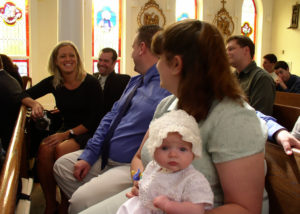1. Pray with a photo of a family member. Thank God for one thing about your loved as you lift the photo up to God. Now hold it close and tell God what he or she needs. Finally, put it down and pray, “Jesus, I give you ______. Be present to my loved one as I surrender her/him into your hands. Amen.” For more suggestions see Praying for our Adult Sons and Daughters.
2. Compile a family cookbook with traditional recipes & a few “spiritual” recipes, like one for forgiveness or listening.
3. Involve a grandchild, niece or nephew in recording stories about your parents, grandparents, great grandparents. Don’t let their stories and especially their faith stories disappear.
4. Design a booklet about your family’s involvement in your particular parish. Include as many generations as possible. What was it like to worship there? What meaningful memories do you have of Masses, Christmas, Easter celebrations, or parish gatherings and friendships?
5. Design an ethical will, based on a favorite Scripture passage. Describe your faith, your values, and your spiritual desires for your family. Ask someone to review it for sensitivity to your particular family needs. Then make arrangements for sharing this will after your passing.
6. LABEL old family photos with a friend or family member. Keep a diary of what it has been like for you to look at the photos. Scan the most important ones and put them on a DVD as holiday gifts.
7. Share Your ‘Love Story” with your family. Share how God was present through good times and bad, as you answered God’s call to a sacramental marriage. Create a family marriage book that includes your parents and grandparents, so future generations can hear about family love stories.
8. Create a photo book about the ways that First Communion or Baptisms have been celebrated in your family, as a beginning point for sharing family childhood faith stories.
9. Combine an obit and a brief bio for deceased family members on findagrave.com or write a prayerful eulogy for a loved one. Here is an example. Bring family members to visit the graves of relatives.
10. Map out a timeline including important events like World War II or “September 11th.” Interview family members about how these events changed their outlook, family relationships or their understanding of the meaning of life. Create a family history scrapbook with these mini-stories.
11. Gather your family to sing religious Christmas Carols, or incorporate carols into an existing holiday event. Invite people to share what they thought of ‘Baby Jesus’ when they were young. End with a few thank you prayers for gifts and particular family traditions.
